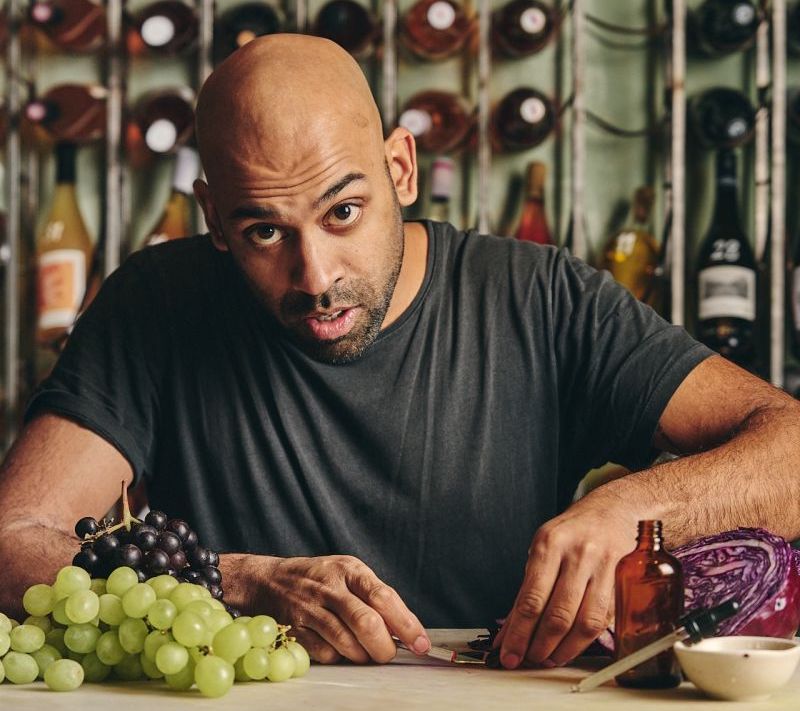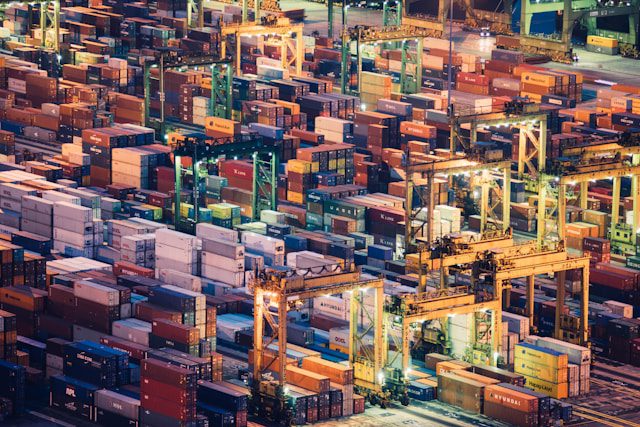Circle members share their perspectives on how wine writers and communicators should respond to the current trade war, and what the future might hold. These interviews are part of Meg Maker’s ‘Navigating the trade war – a communicator’s role From the Chair: Navigating the trade war – a communicator’s role‘ feature.
Sunny Hodge (UK)
 In the short term, Hodge anticipates wine communicators will be kept busy by the shifting global economic landscape, with knock-on effects across hospitality, retail, and the broader wine industry. He notes, “These global economic shifts… will mean there’ll be plenty to keep wine communicators busy. Comms around entire wine regions disappearing from shop shelves, the effect on hospitality, retail, and the wine industry as whole will be plentiful.”
In the short term, Hodge anticipates wine communicators will be kept busy by the shifting global economic landscape, with knock-on effects across hospitality, retail, and the broader wine industry. He notes, “These global economic shifts… will mean there’ll be plenty to keep wine communicators busy. Comms around entire wine regions disappearing from shop shelves, the effect on hospitality, retail, and the wine industry as whole will be plentiful.”
In terms of strategy, Hodge emphasizes agility and immediacy: “As with the pandemic, communications were hard and fast… I feel the same sorts of here’s-what’s-new-today type of comms will reign supreme in the fast-changing economic shift to come. These real and grounded connections to the consumer will be key.”
He sees potential domestic benefit in the UK: “The silver lining here may just be the boost that the British wine scene needs… There will of course be a lot of positive attention to domestically grown and produced wine.”
His advice? “Be reactive and reflective of the market. Things will be changing fast, and quite dramatically; speed to audience will be key, so keep your fingers at the ready.”
Jancis Robinson MW (UK)
 Robinson reflects on the increasingly fragmented global wine landscape, particularly for those communicating across borders. “For those of us who write for a global readership, it’s especially difficult as there will be considerable polarisation of views.” She points to unpredictability and complexity, noting “the range of wines available in most countries will be reduced — not just because of tariffs but because of pressures such as ever-rising costs, EPR, and, in the UK, the complex new duty system.”
Robinson reflects on the increasingly fragmented global wine landscape, particularly for those communicating across borders. “For those of us who write for a global readership, it’s especially difficult as there will be considerable polarisation of views.” She points to unpredictability and complexity, noting “the range of wines available in most countries will be reduced — not just because of tariffs but because of pressures such as ever-rising costs, EPR, and, in the UK, the complex new duty system.”
Looking ahead, Robinson muses that if she were starting out now, she would broaden her focus: “If I were younger, with more of my career in front of me, I would take much more interest in low and no alcohol drinks of all sorts. And I probably wouldn’t focus so narrowly on wine. Wine has served me extremely well for nearly 50 years but I’m not so sure it would for another 50 years!”
As access to global wines may narrow, she encourages writers to pursue discovery and advocacy: “If we’re to see fewer wines and fewer producers in the UK, then all the more reason to go travelling and seek out stories. Perhaps encourage importers to support the really worthwhile producers that we discover.”
Her parting wisdom to the next generation: “Be authentic and find your own voice — maybe become the specialist source of information on a specific aspect of wine, thereby acquiring some status and distinction. Express what you truly believe rather than reading the opinions of others. Work hard, and be nice to people. You may meet them again on the way down!”
Michael Fridjhon (South Africa)
 Fridjhon offers a more skeptical, grounded view, urging wine writers to keep a level head: “Moments of crisis tend to create a sense of impending Armageddon. Sometimes, not always, these dissipate quite quickly. I’m not sure the Trump theatre will have a long run… the dramas of the past few days may not presage a new reality.”
Fridjhon offers a more skeptical, grounded view, urging wine writers to keep a level head: “Moments of crisis tend to create a sense of impending Armageddon. Sometimes, not always, these dissipate quite quickly. I’m not sure the Trump theatre will have a long run… the dramas of the past few days may not presage a new reality.”
With South Africa’s economic volatility dominating local concerns, he suggests the global wine world may overestimate the impact of US tariffs: “The SA Rand has collapsed because of matters relating to domestic politics… The US, while a big market for SA wine, is not a massive one. The impact of the US tariffs will hit other sectors of the economy — most notably citrus and the motor industry.”
If the tariffs remain, he sees opportunity for consumers purchasing European wines: “European wine producers are losing access to a key market — assuming the tariffs remain in their present form for any length of time (which I doubt). This will depress prices… more good wine at lower prices will be good for consumers — as long as their income hasn’t been compromised by the trade war.”
His guidance for communicators is clear: “Wine communicators will be able to guide consumers for whom high-end European wines had been… unaffordable. Producers from more marginal appellations will have less margin to play with, but this will force innovation and make the role of wine communicators more important.”
Åsa Johansson (Italy)
 Johansson sees a shift toward value-driven storytelling in both the short and long term: “Wine communicators need to emphasize value — not just price, but the story, the quality for the cost, and the experience offered.”
Johansson sees a shift toward value-driven storytelling in both the short and long term: “Wine communicators need to emphasize value — not just price, but the story, the quality for the cost, and the experience offered.”
She predicts that “alternative formats (e.g., smaller bottles, bag-in-box)… might gain traction in communication,” and that content will need to meet shifting consumer demographics with tailored approaches: “There might be a greater need for specialized content catering to specific interests and I do believe we need to be open-minded — to sustainable wines, no-low wines, and regional specialties, for example.”
Johansson also foresees a return to human connection: “Difficult times create a desire for meeting in real life. The emotional connection to wine — the people, the place, the history — will become even more vital in driving engagement. Economic uncertainty often brings a sharper focus on value and ethics.”
In terms of tactics, she calls for moving beyond traditional formats: “I think we will move beyond traditional tasting notes and reviews. Especially with AI, I think we wine communicators need to focus our senses even more, on what we see, feel, taste and smell. In times of uncertainty, trust is paramount.”
“Embrace change and be willing to experiment with new approaches without losing ethical values. We all know that there is no money in wine writing… but we still need to eat, so diversifying our work situation is crucial for everyone — without compromising values of independence. Regardless of economic conditions, the core of wine communication lies in connecting people with compelling stories and valuable information.”
Neal D. Hulkower, PhD (USA)
 Hulkower takes a sober view of the potential long-term ramifications of prolonged tariffs. He observes that in the short term, US consumers may scramble to stock up on imported wines before prices spike or availability drops. But he cautions that “in the long term, things are a lot grimmer… there would be no point to tease readers with descriptions of non-US wines which either won’t be imported or will be priced out of range.”
Hulkower takes a sober view of the potential long-term ramifications of prolonged tariffs. He observes that in the short term, US consumers may scramble to stock up on imported wines before prices spike or availability drops. But he cautions that “in the long term, things are a lot grimmer… there would be no point to tease readers with descriptions of non-US wines which either won’t be imported or will be priced out of range.”
He adds: “Wine communicators are uniquely positioned to convey the severe impact on the wine industry worldwide… and should use every medium available to get the word out.” He encourages writers to highlight how each segment — from vineyard to consumer — is affected, and to become voices of advocacy: “A steady drum beat of bad news flooding the mailboxes of legislators is more effective than occasional outbursts.”
Hulkower also urges a redirection of attention inward: “If US wine communicators need to look stateside for material, there are plenty of smaller vinifera growing areas to consider… The point is, necessity should inspire curiosity and challenge preconceived notions of where good juice can be found.”
And finally, some financial advice for wine writers: “If you don’t already have other sources of income, seek them out… At least in the short term, things aren’t going to get better and likely will get worse. Look for bargains in the stock market.”

